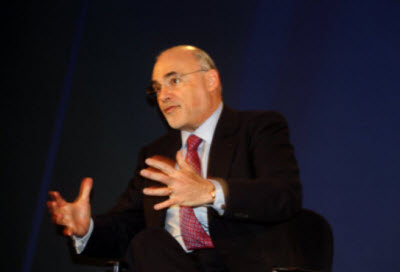
Now HP’s new chief executive Leo Apotheker is contemplating unraveling that with a major reorganization. Software and services are the new emphasis at HP, and HP announced today it may spin off its PC business. HP is also in talks to buy software firm Autonomy, and it is shutting down its WebOS-based handheld and tablet businesses. It seems like drastic surgery for the world’s biggest tech company, but HP’s stock has been in a slump recently — it’s down 25 percent for the year. Currently, HP is valued at a mere $60 billion, while Apple is valued at $339 billion.
[aditude-amp id="flyingcarpet" targeting='{"env":"staging","page_type":"article","post_id":321846,"post_type":"story","post_chan":"none","tags":null,"ai":false,"category":"none","all_categories":"business,","session":"B"}']What this reflects is that there seems to be a life cycle for troubled companies when it comes to vertical integration. HP acquired Compaq a decade ago and then it bought EDS, becoming one of the most vertically integrated companies in the world. For a while, under CEO Mark Hurd, that worked, with earnings and revenue growing. But Hurd was fired in a scandal last fall and Apotheker came in with a sense of urgency to change things for the better.
HP had stumbled badly in the smartphone and tablet business, so much so that it had to buy Palm to get its hands on webOS. Vertical integration works fine if a company is executing. But when things aren’t going so well, it makes sense to shed the parts instead. HP is now in its shedding stage.
AI Weekly
The must-read newsletter for AI and Big Data industry written by Khari Johnson, Kyle Wiggers, and Seth Colaner.
Included with VentureBeat Insider and VentureBeat VIP memberships.
For each big company, the calculation is always different. IBM has thrived as a software and services company while shedding its PC division. But Apple has soared on the strength of not only hardware and software, but on its successful entry into the mobile business. Had HP executed better on the entry into the mobile market, it might not be in the tough spot where it is today.
The spinoff no small decision, as HP is the world’s largest PC maker. It’s not so easy to tear out the PC business from the big company and leave everything else unaffected. But HP missed analysts’ expectations for the third fiscal quarter, and it seems Apotheker has no patience for slow growth.
At the Hot Chips chip design conference in Palo Alto, Calif., a former HP engineer said, “It’s bizarre. It’s like they’re trying to find something that works.”
In the third fiscal quarter that closed at the end of July, HP reported revenue of $31.2 billion compared with $30.7 billion one year ago. GAAP earnings per share were 93 cents and non-GAAP EPS was $1.10. That compared to GAAP EPS of 75 cents and non-GAAP EPS of $1.08 a year ago.
The company said that sales for the fourth fiscal period ending in October will be $32.1 billion to $32.5 billion. That is below the average $34 billion estimate of analysts, according to Bloomberg. Earnings excluding some items will be $1.12 to $1.16 a share, compared with analysts’ $1.31 average estimate.
For the full fiscal year, revenue will be $127.2 billion to $127.6 billion, compared with an average estimate of $129 billion. Earnings excluding some items will be $4.82 to $4.86, missing the average $5 estimate.
[aditude-amp id="medium1" targeting='{"env":"staging","page_type":"article","post_id":321846,"post_type":"story","post_chan":"none","tags":null,"ai":false,"category":"none","all_categories":"business,","session":"B"}']
Now it seems that HP sees more wisdom in bulking up in software and services and shedding its PC business. But there are some tough questions. HP’s cash cow is its printer business, but that is tremendously strong as a business in part because HP sells so many PCs. Will it make sense for HP to keep its printer business and get rid of PCs?
HP is also heavily focused on making servers and high-end supercomputers for the enterprise. The foundation for these businesses include the same Intel-based hardware as HP’s low-end PC businesses. Does it make sense for HP to exit low-end PCs and stay in the high-end server business? For instance, HP is the world’s biggest consumer of memory chips, but will the company still be able to get deals on server-based memory chips if it isn’t buying huge volumes of PC memory chips?
HP has to think about these problems as it moves forward. And it is now learning one of the fundamental lessons of innovation. If you don’t come up with innovations such as the iPhone and the iPad, somebody else will, and there will be hell to pay.
VentureBeat's mission is to be a digital town square for technical decision-makers to gain knowledge about transformative enterprise technology and transact. Learn More
